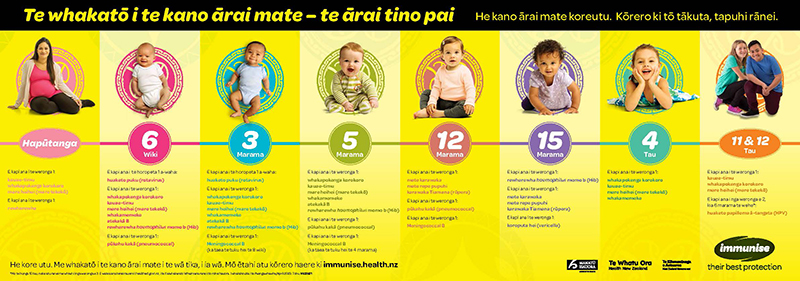Tetanus & Unimmunised Children
Tetanus & Unimmunised Children
Tetanus is a life-threatening condition caused by bacteria in the soil. Tetanus usually develops after a 'dirty' wound but can develop after small or even unnoticed injuries. Only immunisation can prevent tetanus.
Key points about tetanus and unimmunised children
- tetanus is an extremely dangerous disease
- only immunisation can prevent tetanus
- if you decide not to immunise your child against tetanus, you need to take extra steps to keep your child safe if they have an injury
- if your child is not immunised and does have an injury which breaks the skin, please take them to your local emergency department - tell the staff that your child has not been immunised
Read about an NZ family's experience of tetanus in their 7-year-old son, in 2012 (NZ Herald article).
What is tetanus?
Tetanus is a life-threatening condition caused by the bacteria Clostridium tetani in the soil. Tetanus usually develops after a 'dirty' wound but can develop after small or even unnoticed injuries.
Bacteria in the wound produce a toxin. This toxin causes:
- the muscles to stiffen around the jaw, neck, back, chest, tummy, arms and legs
- sometimes, a high temperature and sweating
- nerve irritation, which leads to severe and painful muscle spasms all over the body, and difficulty breathing
How serious is tetanus?
Someone with tetanus will be very sick and need to go to hospital. Children and old people are especially at risk.
About 1 in 10 people who catch tetanus will die. In those who survive the disease, recovery can take many months, including time in intensive care.
Who is at risk of tetanus in New Zealand?
There were about 30 tetanus cases (adults and children) in New Zealand from 1997 to 2014. Of the children who have had tetanus in recent years, all were unimmunised.
If I choose not to immunise my child against tetanus, how can I keep them safe after an injury?
If you decide not to immunise your child against tetanus, you need to take extra steps to keep your child safe if they have an injury that breaks the skin.
Please go to your local emergency department and tell the staff that your child has not been immunised.
What will happen in the emergency department, if my child is at risk of tetanus?
Clean and minor wounds
In the emergency department, if the wound is clean and minor, hospital staff will need to give your child the tetanus vaccine. This is for the safety of your child. This is less effective at preventing tetanus than immunisation before any injury.
Dirty and deep wounds
If the wound is dirty and deep, your child is at high risk for developing tetanus. They will need tetanus immunoglobulin as well as the tetanus vaccine. Tetanus immunoglobulin is a concentrate of antibodies to tetanus taken from the blood of immunised donors. It is less effective at preventing tetanus than immunisation, but it can help make the disease less severe. It can also help reduce the time your child has the infection.
How can I prevent tetanus in my child?
Only immunisation can prevent tetanus.
You get tetanus from the environment, rather than from other people. For that reason, you cannot rely on immunisation of other people to provide any protection to your unimmunised child.
Immunisation against tetanus is part of the free immunisation schedule for your child at 6 weeks, 3 months, and 5 months of age with boosters at 4 and 11 years of age (and adults also need boosters). If your child is older than 12 months and unimmunised, there is a catch-up schedule - 3 doses at least 4 weeks apart.
Free immunisations for tamariki in Aotearoa New Zealand
Immunisation short videos - why immunise?
Immunisation short videos - vaccine preventable diseases are serious
Where to go for immunisation
You usually need to take pēpi and tamariki to a GP practice for their immunisation.
Some pēpi and tamariki can have their immunisation from other services like Māori and Pacific providers or outreach services.
Check immunisation providers in your area.
Can my child have tetanus-only immunisation?
There is no vaccine for children that protects only against tetanus in New Zealand. It is a combination vaccine.
Is tetanus immunisation safe?
Tetanus immunisation is extremely safe, extremely effective, and necessary to prevent tetanus infection. Talk to your health professional about any questions you may have.
The vaccine contains modified (inactivated) tetanus toxin and no live bacteria. Mild reactions such as pain or redness where the needle went in are common. More general reactions such as headache, fever or tiredness are uncommon. Serious reactions including allergy are very rare.
See more KidsHealth content on immunisation
This page last reviewed 20 June 2023.
Do you have any feedback for KidsHealth?
If you have any feedback about the KidsHealth website, or have a suggestion for new content, please get in touch with us.
Email us now


